- Home
- slideshows
- miscellaneous
- The best bug sprays and repellents you can buy
The best bug sprays and repellents you can buy
The best bug spray with DEET

The best bug spray without DEET
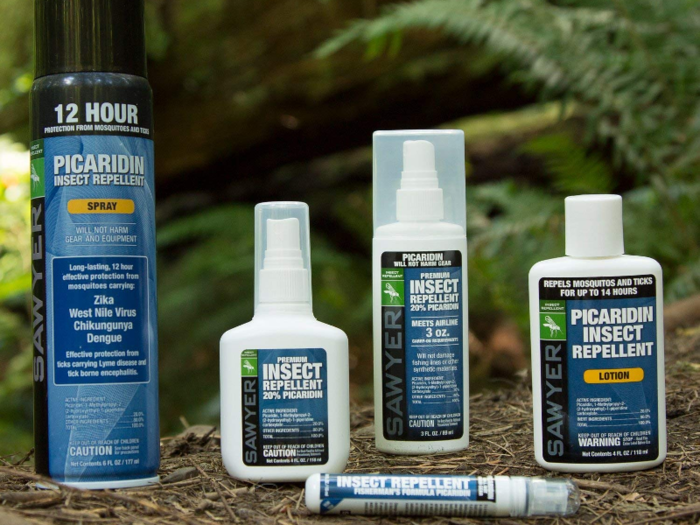
Sawyer Premium Insect Repellent with 20% Picaridin is excellent at warding off insects of the gnat, sandfly, and mozzie varieties. Picaridin, the active ingredient found in this spray, has recently been deemed nearly or as effective as DEET in warding off ticks, though we'd like to see more research before we can confidently recommend it as our top pick.
Ticks are a big problem in North America because the continent has the largest contiguous deciduous forest on earth, and it's just the kind of environment in which the little buggers proliferate. Plus, cases of Lyme disease are on the rise worldwide.
But, for those who choose to avoid DEET for one reason another, we like picaridin as an alternative. While it's still toxic to the ecosystem, it is considerably less damaging than DEET. Picaridin isn't half as offensive to the nostrils as products containing DEET, either.
The EWG recommends picaridin for children over six months of age, though the group suggests refraining from applying it to kids' hands because it's still an irritant for eyes. The netting found in DreamBaby's strollers and car seats and SSQQ's bed netting for cribs and beds is an excellent alternative to sprays for newborns and infants. You can also treat their clothing with permethrin.
Lucie's List also recommends Sawyer's picaridin, and it enjoys an exceptional reputation among Amazon's 3,000+ reviewers. You can read more about the latest research on picaridin at the National Pesticide Information Center's website, and on the EPA's fact list for bug spray.
Pros: Less toxic than DEET, potentially as effective, won't ruin plastics or plastic-based clothing
Cons: Not yet enough longterm research suggesting its efficacy over DEET, still toxic to wildlife though not as toxic as DEET
Buy a 4-oz. bottle of Sawyer Premium Insect Repellent with 20% Picaridin on Amazon for $8.25The best bug spray for clothing
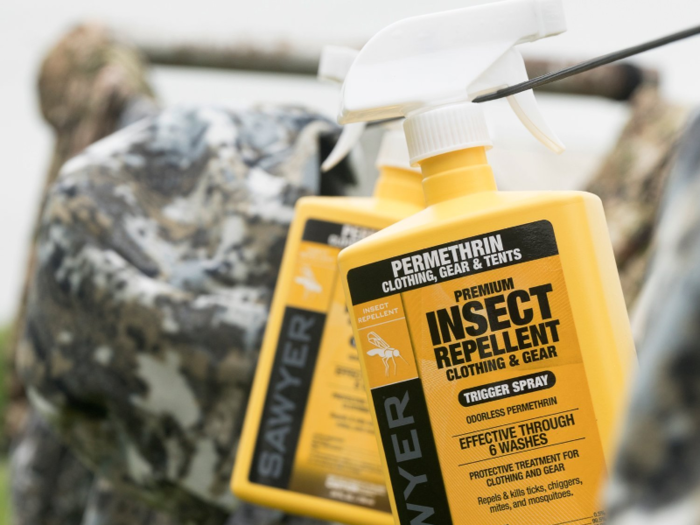
I don't like killing anything more than you do, but "live and let live" just doesn't fly when some pestilent little blood-sucking insect or arachnid threatens to sentence me to a slow, agonizing disease or, you know, death. Sorry little critters, but Lyme Disease and Malaria are no joke.
Permethrin, which is what doctors prescribe to patients with lice and scabies, is an odorless solution that works wonders against most any creepy crawly thing this planet might toss at you. The only shortcoming is that it does not stay on our skin for much longer than 15 minutes, so it's hardly effective at all unless you're wearing clothes.
For hunters and anglers, giving off any scent, let alone one so unnatural and odorously offensive as that of DEET is death to their pursuit. In fact, if a serious enough hunter or angler catches you applying the stuff on the way into the woods or out onto the sea, they are likely to make you shower it off, or worse, leave you in the parking lot.
I have a friend who bans both sunscreen and bug spray on their boat because, according to them, the scent it produces on the line makes fish that much more wary of taking a bait. A quick test proved them right.
Sawyer Premium Permethrin is the stuff the hunters I know swear by, and if anyone can attest to its efficacy, I'm sure it's them. Whenever I go into the woods, I do my best to reach for permethrin because, even though I'm not much of a hunter, DEET can send plenty of animals running. Further, I do happen to be an angler, and I prefer to capture my quarry alive, and free of chemical spoilage.
Sawyer Premium Permethrin is also a good choice for babies and youngsters, so long as they're well-covered, of course. Campers would also best serve themselves by spraying down tents, hammocks, sleeping bags, and any other fabrics they take camping with a permethrin-based product like Sawyer's spray repellant.
Pros: Excellent efficacy on clothes and other fabrics
Cons: Evaporates from skin within 15 minutes, kills most insects that set foot on it
Buy a 24-oz. spray bottle of Sawyer Premium Permethrin on Amazon for $14.99 (other sizes available)The best natural alternative to bug spray
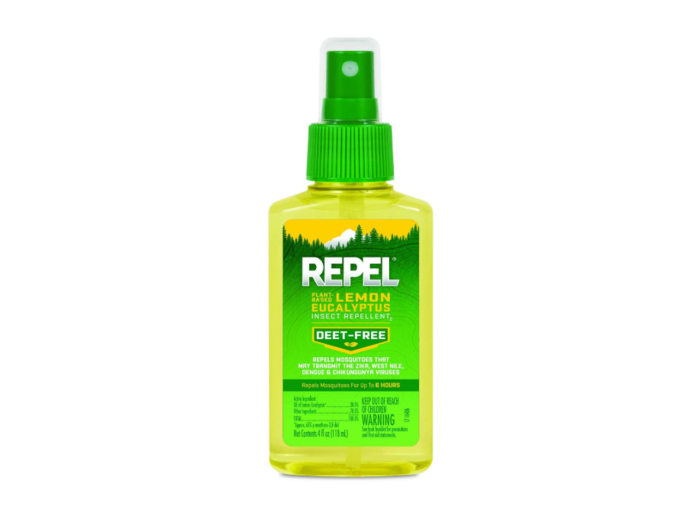
For those of you who are seeking alternatives to DEET, permethrin, and picaridin, natural ingredients work moderately well, but "oil of lemon eucalyptus" (PMD — as opposed to "lemon eucalyptus oil") may be the next best thing. Repel's bug spray with Lemon Eucalyptus Oil is effective and safe to use.
According to the EWG, a longevity study which took place between 2000 and 2013 showed that PMD evaporates from skin much more slowly then DEET or picaridin.
It's important to note that while it may be effective to some degree, it does not quite stack up to chemical repellents, so if you live in an area with lots of ticks or deadly mosquitos, we recommend something stronger like DEET or picaridin.
Still, it smells good, and it does seem to do a pretty good job. Just don't expect to find me relying on this stuff in the Cambodian jungle.
Pros: Smells better than DEET, inexpensive, nontoxic
Cons: Less effective than Picaridin or DEET
Buy a 4-oz. pump bottle of Repel with Lemon Eucalyptus Oil on Amazon for $5.29The best essential oils for DIY bug spray
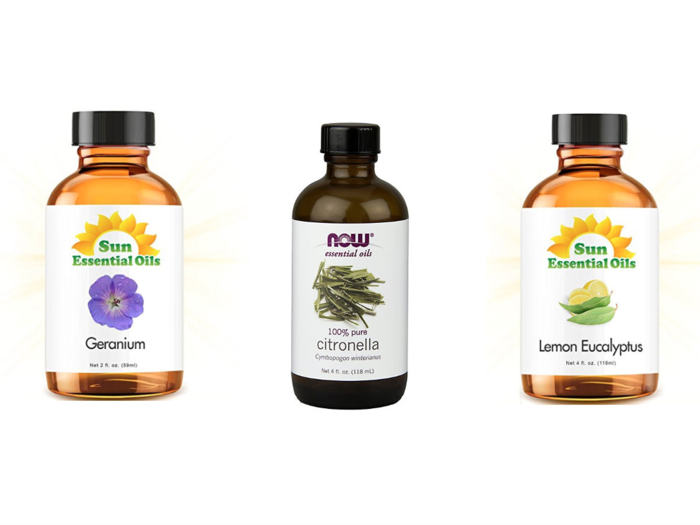
If you want to make your own natural bug repellent, there is a whole host of essential oils that deter blood-thirsty bugs, but, again, they probably won't do as good of a job as DEET or picaridin.
For mosquitoes, thyme, lemongrass, citronella, lavender, geranium, grapefruit, and cedar wood are all popular essential oils. At least a 40-drop combination of any of the above is best, but try to keep the concentrations on the high side. It's probably not worth putting together more than about four at a time unless you're making a boatload of the stuff. Check out Natural Living Ideas for more ideas.
Marian Grande at Medium has several recipes for deterring ticks that smells pretty good. The easiest of which involves just a half a cup of water, 20 drops of eucalyptus oil, and 20 drops of lemongrass oil. Another calls for geranium, cedarwood, lavender, lemongrass, and water, and smells pretty great.
Of course, it's also a good idea to follow general precautions, like staying well-covered, spraying down all clothing and fabrics with your concoction of choice, tucking your pant legs into your socks, staying on trails when possible, and keeping clear of low-hanging branches.
Lastly, not even DEET itself is completely bugproof, so be sure to check all of your clothes, do your friends, family, and yourself a favor by going over one another to make sure there aren't any hangers-on.
Pros: These essential oils will smell far better than DEET to most, and they won't kill fish and/or insects you might otherwise want to let live
Cons: Not as effective as DEET, picaridin, permethrin, IR3535, or PMD
Buy oil of lemon eucalyptus (30%, processed, and not to be confused with "lemon eucalyptus oil"), geranium, cedarwood, lavender, rosemary, eucalyptus, grapefruit, citronella, garlic, thyme, peppermint, and lemongrass oils, or any combination thereof, on Amazon, starting at $5.99A breakdown of the most common bug spray ingredients
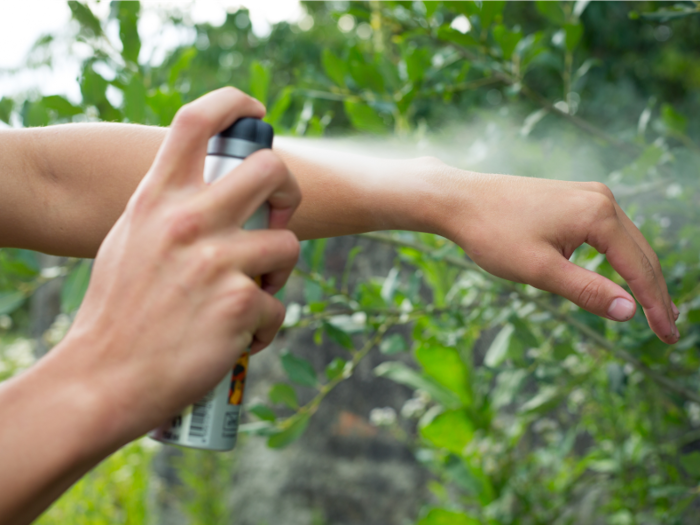
Bayer AG came up with picaridin in 1980, but it didn't start to hit shelves until 1998 around the world and in 2005 in the US. Picaridin is a derivative of the plant genus Piper and a less but still "moderately toxic" compound for rainbow trout. The EPA's recent research suggests that it's as effective against ticks as DEET, and on average, lasts longer. The EPA, CDC, and WHO all agree that it's a comparable DEET alternative.
The compound is more popular in Australia and Europe, where it has been available since 1998 and tick-borne illnesses are slightly less common, but DEET remains the staple in the United States.
DEETDeveloped by the US Army to protect soldiers from tropical disease-bearing insects in the tropics, DEET or N,N-Diethyl-m-toluamide has been the most popular bug repellent in the US since it hit the mass market in 1957. While there has been some degree of controversy over its toxicity, it is highly effective at warding off ticks, mosquitos, and ot ehr insects.
Scientific research published this year by the CDC (Center for Disease Control) shows that of the 650,000 cases of vector-borne (blood-feeding insect-originated) diseases reported in the United States over a 12-year period from 2004-2016, more than 75% were from ticks. So while DEET may be less than ideal for aquatic creatures, it is great protection against the serious diseases you can get from ticks, mosquitos, and so on. The real issue with DEET is that it's highly toxic to aquatic creatures.
PermethrinA synthetic derivative of the chrysanthemum flower, permethrin is an insecticide used to exterminate mites like lice and scabies, but it's also effective with anything else, which is why the US Army has been treating BDU's with it for the last two decades.
Permethrin is perhaps the least toxic of all the chemical-based bug repellents, but it's also the most odorless and the least effective on bare skin, where it can wear off in as quickly as 15 minutes. On the other hand, it lasts many weeks when applied to clothing — even after several washes — and because it's odorless, it's the ideal bug spray for hunters, anglers, and wildlife stalkers.
IR3535In the 1970s, Merck developed something called IR3535, which stands for "Insect Repellent 3535," and could probably stand to take on a common name. It was only introduced to the mass market in 1999 and is billed by the EWG as being a "strong" mosquito repellent, and a "good" tick repellent, which isn't quite good enough to knock DEET or picaridin off their thrones, at least at this point.
Essential oilsWhile not exactly clinically proven, a combination of essential oils is endorsed by many, and, as someone who spends countless hours in tick-infested wooded and shrub-strewn areas, I haven't found a tick on myself since I started using them, particularly the formula put together by Burt's Bees, which also, in my opinion, smells kind of nice, too. I also like that you can rub them all over your face without worrying about ingestion.
Check out our other outdoors buying guides
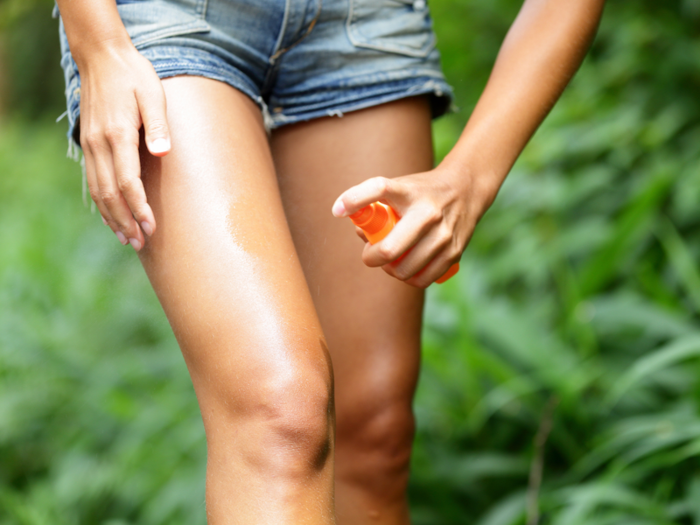
Effective mosquito prevention requires a multi-pronged approach in which you remove breeding grounds, kill off adult insects, and deploy products that repel these dangerous pests. If you had to choose just one item for your anti-mosquito arsenal, a wise choice would be time-tested OFF! Deep Woods Insect Repellent with its 25% DEET concentration that wards off mosquitoes, ticks, flies, and more. Here are our top picks for the best mosquito repellent products:
- Best mosquito repellent: OFF! Deep Woods Insect Repellent
- Best repellent for yards: Cutter Backyard Bug Control Spray Concentrate
- Best mosquito repellent wipes: Aunt Fannie's Mosquito Repellent Wipes
- Best bug zapper: Stinger Insect Zapper
- Best mosquito repellent candles: Light in the Dark Votive Citronella Candles
- Best mosquito traps for water: Summit Mosquito Dunks
- Best outdoor fan: Designer Aire Outdoor Standing Pedestal Fan
It's not a picnic without a picnic blanket, so we've done the research to find the best ones you can buy. The Picnic Time Outdoor Picnic Blanket Tote XL is our top pick because it's big, soft, and easy to carry around for any outdoor fun you can imagine.
Here are our top picks for the best picnic blankets you can buy:
- Best picnic blanket overall: Picnic Time Outdoor Picnic Blanket Tote XL
- Best picnic blanket for comfort: Nemo Victory Blanket
- Best picnic blanket for kids: MIU Color Blanket
- Best picnic blanket for colder weather: Down Under Stadium Blanket
- Best compact picnic blankets: Matador Pocket Blanket and Mini Pocket Blanket
The gas grill is the centerpiece of your backyard during summertime barbecues, so you should invest in a great one. Here are our top picks for the best gas grills you can buy:
- Best overall: Broil King Regal S590 Pro 5 Burner Natural Gas Grill
- Best value: Weber Spirit II E-310 LP Gas Grill
- Best portable grill: Coleman Road Trip Propane Portable Grill LXE
- Best compact grill: Dyna-Glo Smart Space Living 3 Burner LP Gas Grill
- Best charcoal and gas grill: Char-Griller Double Play 3 Burner Gas and Charcoal Grill
There's nothing like food cooked up al fresco and served hot off the grill. But only a thoroughly cleaned grill can properly cook smoky, savory meats and veggies that diners will devour. Here are our top picks:
- Best grill brush overall: Kona 360° Grill Brush
- Best grill brush and scraper for stubborn residue: BBQ-Aid Grill Brush and Scraper
- Best low-cost grill brush: Room Essentials Tough Brush
- Best cleaning tool for charcoal grills: Charcoal Companion Safe Scrape Non-Bristle Cleaning Tool
- Best grill cleaning brick: KegWorks Grill Cleaning Brick
A sleeping bag is more than a matter of comfort. In extreme circumstances, having the right sleeping bag can be a matter of life and death. But that's no reason not to find one that's nice and cozy, too. The Hyke & Byke Quandary 15 Degree sleeping bag is warm and comfortable, lightweight and compactable, and it won't break the bank. Here are our best picks for the best sleeping bags you can buy:
- Best overall: Hyke & Byke Quandary 15 Degree sleeping bag
- Best for extreme cold: Mountain Hardware Lamina Z Bonfire
- Best for a budget: Coleman North Rim Extreme Weather
- Best for casual comfort: Teton Sports Fahrenheit
- Best for couples: Sleepingo Double Sleeping Bag
Popular Right Now
Popular Keywords
Advertisement